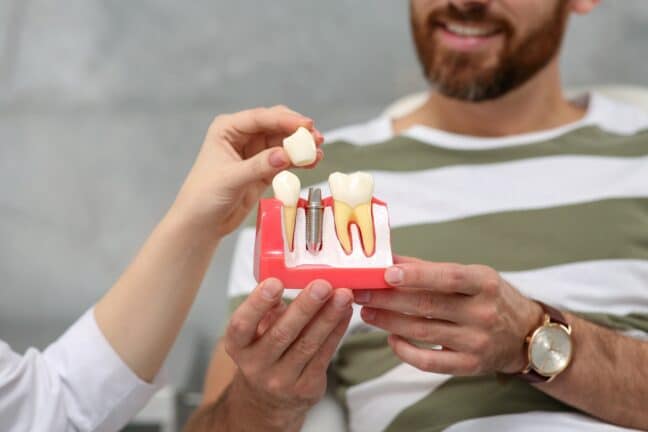Dental implants offer a permanent replacement for missing teeth that are not only durable and attractive but also function in a way that closely resembles natural teeth. This unique feature of dental implants, their ability to mimic the natural function of teeth, can provide you with the reassurance you need when considering tooth replacement options.
What are the Parts of a Dental Implant?
A dental implant consists of three primary components: the implant, the abutment, and the prosthetic or crown. Each part plays a crucial role in ensuring the implant functions effectively and integrates seamlessly with the natural anatomy of the mouth.
Implant
The implant itself is a small, screw-like post, usually made of titanium, which is biocompatible and capable of fusing with the jawbone through osseointegration. This component acts as the artificial tooth’s root, providing a stable and secure foundation.
Abutment
The abutment is a connector placed on top of the implant, linking the implant to the prosthetic or crown. It ensures a snug fit and proper crown alignment, allowing for optimal function and appearance.
Dental Prosthetic or Crown
The dental prosthetic or crown is the visible portion of the dental implant. It looks and functions like a natural tooth. Depending on how many teeth are being replaced, the prosthetic may be a simple crown, a partial denture, or an entire arch of replacement teeth. The prosthetic or crown is custom-made to match the surrounding teeth’s shape, size, and color, ensuring a natural and harmonious appearance.
What Do Implants Do?
Dental implants offer several vital benefits that extend beyond simply filling the gap left by a missing tooth. Their design provides excellent function that contributes to and restores oral health and overall quality of life.
Prevent Jawbone Loss by Stimulating Jawbone
One of the most critical functions of a dental implant is to prevent jawbone loss. When a tooth is lost, the lack of stimulation to the underlying bone can lead to resorption, where the bone deteriorates over time. The implant mimics the natural tooth root, stimulating the jawbone and helping maintain its density and shape.
Spread Out Pressure of Chewing Over Jawbone
Dental implants help distribute the pressure of chewing across the jawbone evenly. This distribution prevents excessive stress on any single part of the jawbone, reducing the risk of damage or deterioration and mimicking the natural function of a natural tooth.
Provide Stability and Support for Restorations
Implants offer stability and support for dental restorations, such as crowns, bridges, or dentures. Unlike traditional dentures, which can slip and cause discomfort, implants are firmly anchored in the jawbone, providing a secure and comfortable fit.
Improve Ability to Chew, Speak, and Eat
With dental implants, patients can enjoy a significant improvement in their ability to chew, speak, and eat. The stability and strength of implants allow for normal biting and chewing forces, making it easier to enjoy a wide range of foods. Additionally, they do not impede speech, allowing for clear and natural communication.
Provide a Permanent Solution for Missing Teeth
Dental implants offer a long-lasting, often permanent solution for missing teeth. With proper care and maintenance, implants can last a lifetime, providing a secure and reliable option for tooth replacement.
Clearly, dental implants work hard to provide you with a variety of advantages. Understanding how they do this may make it easier to decide if they are the right way to restore your smile.

